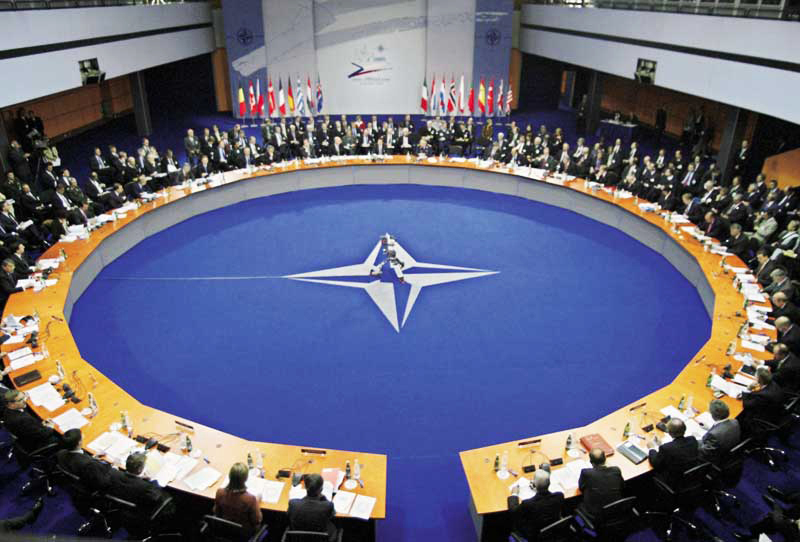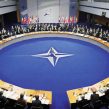
UKRAINIAN AND GEORGIAN MEMBERSHIP PROSPECTS INTENSELY DEBATED AT NATO SUMMIT
Publication: Eurasia Daily Monitor Volume: 5 Issue: 64
By:

Midway through the NATO summit in Bucharest on April 2 to 4, Germany and France seemed to have blocked the approval of Membership Action Plans for Ukraine and Georgia (MAPs). The summit representatives have until April 4 to agree on substitute language regarding Ukraine’s and Georgia’s future relationship with the Alliance. The Russian government continued down to the wire to threaten Georgia and Ukraine with retaliatory actions if they moved toward NATO membership.
U.S. President George W. Bush tried hard to change the German and French position at the summit, as he had during the run-up to the event and on his April 1 stopover in Kyiv. Arriving in Bucharest, he declared, “We must make clear that NATO welcomes the membership aspirations of Georgia and Ukraine and offers them a clear path forward toward that goal. My country’s position is clear: NATO should welcome Georgia and Ukraine into the Membership Action Plans” (White House transcript, April 2). Addressing the U.S.’s German Marshall Fund (GMF) curtain-raising event at the summit, Bush argued that approval of the two MAPs would stimulate the two countries to continue on the path of democracy and reforms and would signal “throughout the region” [i.e., to Russia] that Ukraine and Georgia are and will remain independent countries.
Italian Prime Minister Romano Prodi’s government aligned itself with Germany in opposing the Ukrainian and Georgian MAPs. The announcement added that Italy could change its position and support the MAPs if the German government would change its position (La Repubblica, April 2). The Belgian and Dutch governments also hesitated until the last moment, implicitly underscoring Germany’s leading role in pushing for a decision to Russia’s liking within NATO.
Among the many fence-sitters, Britain argued before and during the summit that this was “not the right moment” for MAP decisions. “Premature,” Prime Minister Gordon Brown opined (The Times [London], April 3). Britain also called for de-emphasizing the MAP issue as such, in order for Russia to see a ed NATO.
“NATO to unite around what? Around appeasement?,” Georgian President Mikheil Saakashvili asked. “Appeasement is seen [in Moscow] as a signal that they should act even more toughly and they will be even more aggressive and provocative. . . . If we get MAP, the aggressive elements will back off. If we don’t get it, they are going to start all kinds of trouble” (Financial Times, March 31). At the summit, Minister of Foreign Affairs Davit Bakradze argued that failure to approve the MAPs would signify an indirect Russian veto to NATO and that a negative decision in the wake of the Russian threats “would strengthen those aggressive forces in Russia; blackmail and pressure would grow stronger. … A ‘no’ to Georgia would show those people in the Kremlin that they can influence NATO decisions” (Rustavi-2 TV, AP, April 2).
Romanian President Traian Basescu, host of the summit, told Russian media forthrightly during the event, “Georgia’s and Ukraine’s own choice is what counts. If they ask to join NATO, now or in the future, the Alliance must agree to this” (Itar-Tass, Izvestiya, April 3).
The April 2 working dinner, where the top leaders of the 26 member countries were to decide on the Georgian and Ukrainian MAPs, ended inconclusively. The United States, Canada, and nine new member countries spoke in favor; Germany and France were joined by Italy, the Benelux countries, and Hungary against the MAPs, according to German diplomats in attendance (New York Times, April 3).
It became clear during the GMF forum, however, that the Germans and French were unable to hold their own in the debate on the merits. Politically, the German and French leaders chose to de-escalate the dispute. French President Nicolas Sarkozy, while opposing the MAPs, agreed to “recognize the legitimacy of these two friendly countries to be part of the Atlantic Alliance,” albeit without a time-frame (Agence France Presse, April 3). German Chancellor Angela Merkel, who had led the campaign against the MAPs in recent weeks, adopted a low-key tone in the summit discussions. Midway through the summit, Bush and Merkel instructed their respective national security advisers to work out the language of the communiqué and a formula for revisiting the MAP issue at follow-up NATO meetings.
The Germans and French evidently decided to avoid any appearance of reconstituting a “Moscow-Berlin-Paris Axis” in opposition to the Ukrainian and Georgian MAPs. Berlin seemed inclined to act as linchpin in such a trio in March, coordinating with Moscow and Paris; but Germany stepped back quickly from a course that could have compromised the NATO summit. Paris hesitated to align publicly with Berlin, although the French Ministry of Foreign Affairs and the National Security Council sympathized with Berlin’s resistance to the Ukrainian and Georgian MAPs. As the moment of decision approached at the summit, no member country would back Moscow’s anti-MAP agenda directly or even indirectly.




